Sports of the Future: Inclusive, Accessible, and Empowering, a look back at an afternoon of exchanges at the European Parliament
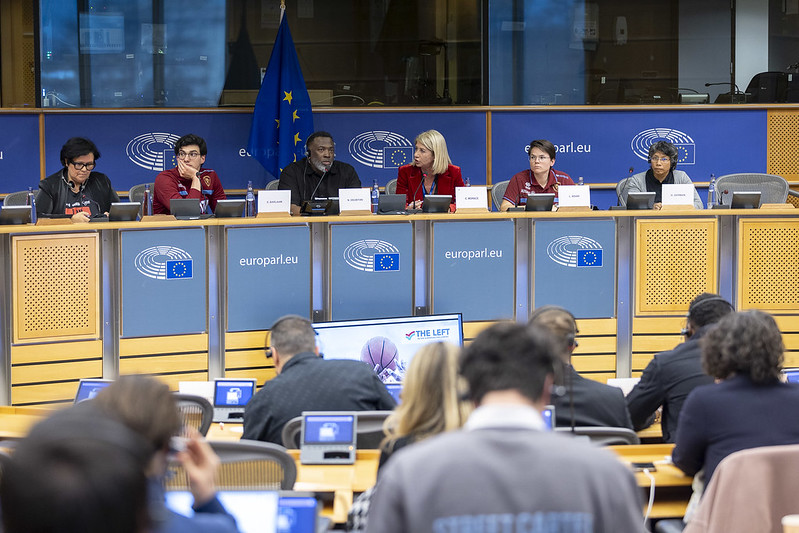
Photo by José Gonçalves
Léo Vinet, European Affairs Officer, Think tank Sport and Citizenship
Sport is central to personal development, self-confidence and a healthy lifestyle. However, there are many barriers to access to sport for all. On Thursday 6 March 2025, the European political group The Left organised a conference at the European Parliament in Brussels on the future of sport: inclusive, accessible and empowering. It was an opportunity for Sport and Citizenship to listen to the testimonies of a number of top-level athletes and to follow closely the group’ political priorities on these issues, which are at the heart of our Think Tank’s social and political engagement.
A limited recognition of disability
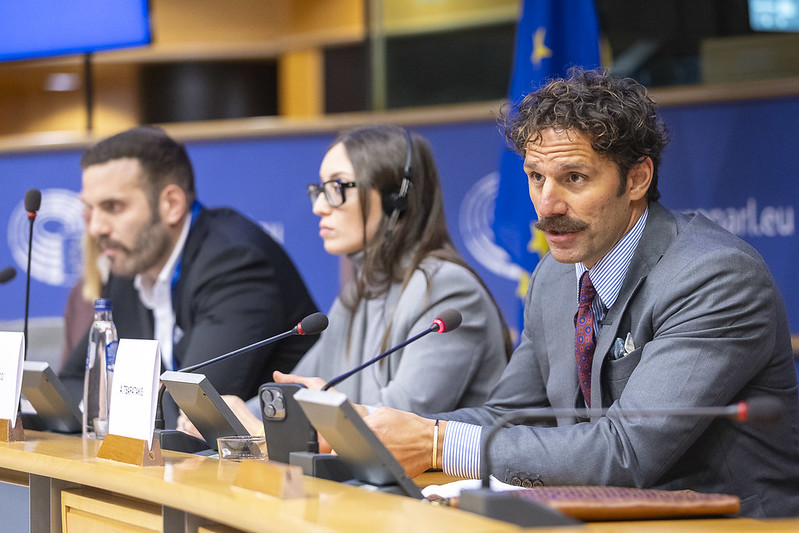
Left to right : Nikos Pappas / Vittoria Bianco / Antonis Tsapatakis- Photo by José Gonçalves
The inclusion of people with disabilities faces many limitations. Vittoria Bianco, Antonis Tsapatakis, and Simone Barlaam, all three successful Paralympic swimmers, highlight these obstacles. Among them, they lament the lack of media visibility for parasports and the persistent misunderstandings about different forms of disability. The opportunities available to these groups are also limited or insufficiently publicized.
Moreover, they criticize the lack of accessibility in sports infrastructure across Europe, despite sports being a universal right. They call for increased funding to support sports participation for people with disabilities. Additionally, they emphasize the importance of awareness and education about sports and tolerance from an early age to dismantle stereotypes about disability and enable everyone to engage in physical activity freely.
Through European projects such as InAbled Cities, Sport and Citizenship has been committed for several years to improving access to sports for people with disabilities. Our association promotes awareness among people with disabilities and their families about the benefits of sports, better information on available sports opportunities, full accessibility of sports facilities for all types of disabilities, and strengthened cooperation between the sports and medical-social sectors.
Gender equality: obstacles and solutions in sport
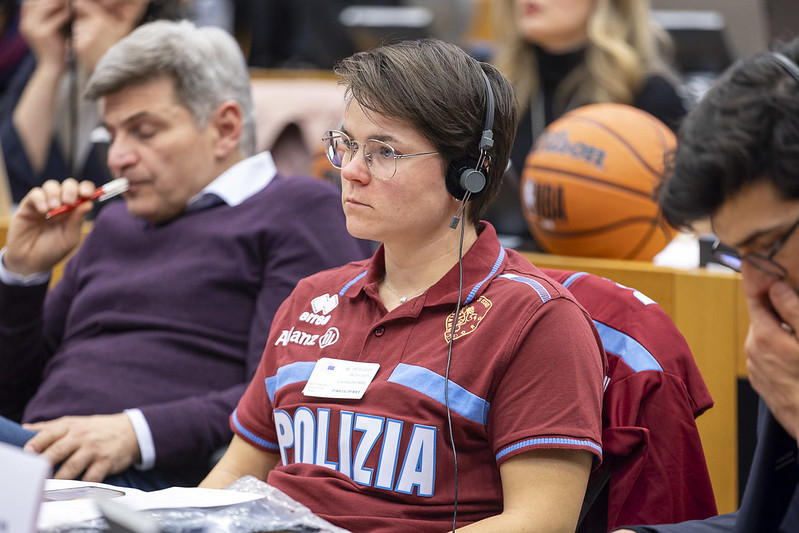
Lucilla Boari – Photo by José Gonçalves
Sport is still a male-dominated environment, with certain patriarchal and masculinist codes, as Athina Papafotiou, a professional volleyball player, pointed out. Indeed, gender inequalities are particularly present in the world of sport, through gender stereotypes, differences in subsidies and rewards during competitions, their personal lives in terms of menstrual cycles and their parental lives. A. Papafotiou highlighted the existence of sports contracts containing termination clauses in the event of pregnancy, which jeopardise the rights of sportswomen to lead a family life. The media’s treatment of female sportswomen also remains a cause for concern, as Lucilla Boari, an Olympic winner archer, testifies. Women’s appearance is still too often scrutinised, rather than their sporting performance. Finally, they both point to the under-representation of women in sports governing bodies, which has a direct impact on the measures established to combat inequality and gender based violences.
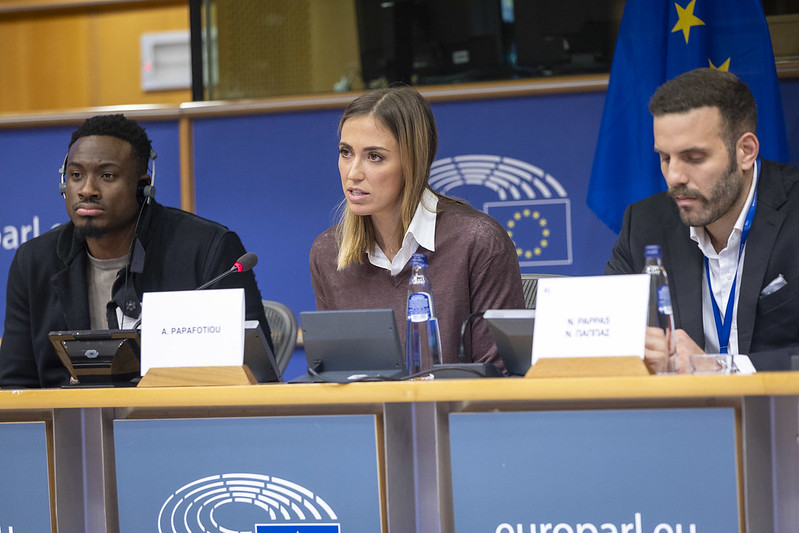
Athiná Papafotíou – Photo by José Gonçalves
Sport and Citizenship stresses the importance of increasing the number of women in governing bodies and in key positions in sports management and refereeing. Promoting gender equality in sports also requires equal media coverage for men and women. We advocate for better recognition of maternity rights for elite female athletes and encourage following the example set by France through the Collective Agreement for professional handball players and many other top-level sportswomen in recent years.
LGBT+phobia: ongoing challenges in sports
Another issue addressed at the event was discrimination and violence against the LGBT+ community. They are still widespread in the sports sector, as shown by a recent study produced by the European Gay and Lesbian Sports Federation (EGLSF), which highlighted that 82% of those questioned had witnessed homophobic or transphobic comments in a sporting context over the previous 12 months. Revealing one’s sexual orientation is always a source of new discrimination, as Lucilla Boari reminded us. She is often considered more in terms of her sexual orientation than her sporting achievements.
Hélène Germain, President of the French LGBT+ Sports Federation, then proposed a number of solutions to the discrimination and violence that are at the root of the barriers to sport for these groups, pointing out the existence of good practice in France and Europe. She recalled the importance of inclusive sporting events accessible to all, such as the Euro Games or the presence of the Pride House at the recent Paris 2024 Games, and the need to rethink sporting categorisations that exclude trans people from competitions. She also stressed the importance of continuing to raise awareness and educate as many people as possible about these issues in order to combat the reproduction of stereotypes and discrimination.
In 2021, our Think Tank teamed up with the FIER Foundation to publish “Sport and Pride“, a collection of testimonials from leading figures in the sporting world from the LGBT+ community or allies, committed to inclusive sport. This initiative was a reminder of the need to get people talking and to create role models. The collection of best practices “For an inclusive and respectful sport“, produced in collaboration with the DILCRAH (Délégation interministérielle à la lutte contre le racisme, l’antisémitisme et la haine anti-LGBT) in France, is a continuation of our collaboration with the FIER Foundation, to ensure that tomorrow’s sport is no longer a LGBT-phobic environment and a place for violence and discrimination against LGBT+ community.
Racism: a societal issue reflected in sports
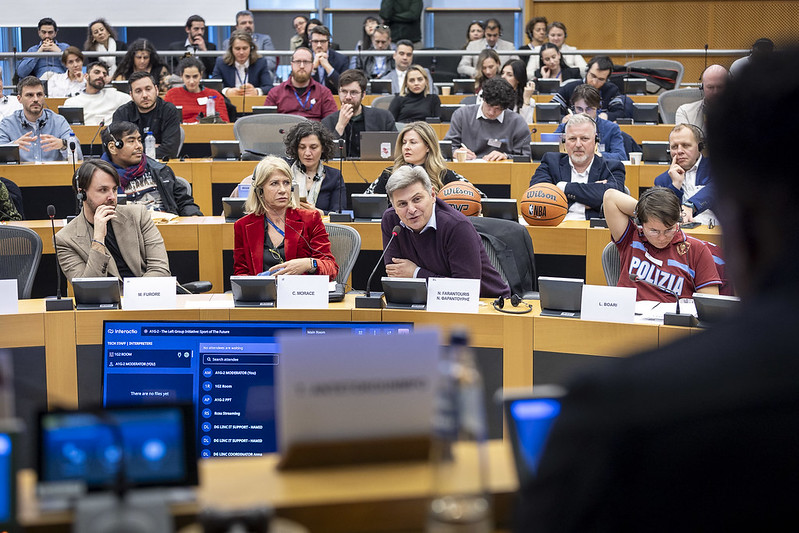
Photo by José Gonçalves
As a reflection of society, sport is not immune to racist discrimination, as Nikos Odubitan, an activist for the rights of second-generation migrants, and Thanasis Antetokounmpo, a professional basketball player in the NBA, have shown. Racist stereotypes and behaviours are still very much present in sport. Moreover, N. Odubitan addressed the challenges faced by refugee and asylum-seeking athletes in integrating and competing due to their migration status. Both advocate for more accessible sports, an objective shared by our think tank, which stresses the importance of educating and training sports professionals on these issues.
In Belgium, Sport and Citizenship launched the 60 Minutes to Combat Discrimination in Sports project, which trains sports educators on preventing discrimination. Additionally, we have been actively involved in educating and training sports professionals on the role of football and sports in refugee inclusion through the European FIRE+ project.
Following on from the discussions at the conference, our Think Tank Sport and Citizenship firmly reaffirms its commitment to truly inclusive sport, accessible to all, regardless of gender, sexual orientation, origin or physical and mental condition. Through concrete and ambitious projects, we are working to make sport more equitable and universal.
By placing inclusion and solidarity at the heart of its actions, Sport and Citizenship is pursuing its mission: to make sport a powerful lever for social cohesion, equality and emancipation, true to the values of a fairer society open to all.










 MEMBERSHIP
MEMBERSHIP CONTACT
CONTACT FACEBOOK
FACEBOOK